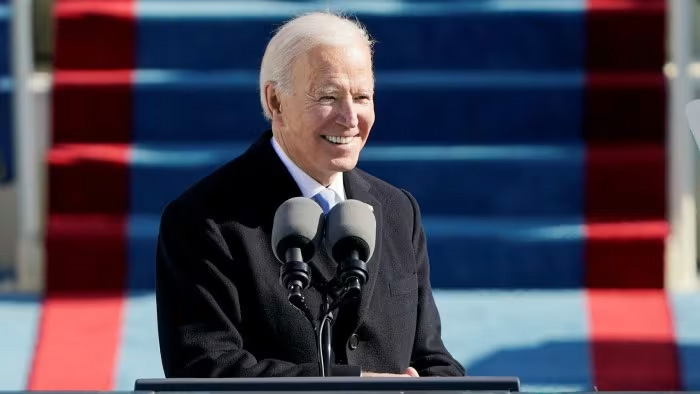Biden wobbles under weight of multiple open fronts around the world
Long gone is the Joe Biden of February 2023, strolling confidently through the streets of Kyiv, basking in the role as champion of the Ukrainian cause in the fight against Vladimir Putin’s Russia.
Nearly one year after that triumphant appearance, the US president is instead facing the harsh realities of running for re-election while bogged down in one stagnant war and navigating the volatility of another, as the conflict in Gaza threatens at any moment to ignite the entire Middle East.
In fact, Israel’s war with Hamas has already boiled over into the Red Sea and Gulf of Aden as Yemen’s Tehran-backed Houthi rebels have attacked ships in the region and other pro-Iranian groups have targeted American troops in Iraq in Syria. Both have sparked retaliatory US strikes.
The United States is not at war, but entanglement in multiple military fronts — plus the ongoing migrant strife along the US-Mexico border — is not an ideal environment for Biden as he ramps up his campaign for reelection in November.
And even worse for the 81-year-old Democrat: his likely Republican opponent, former president Donald Trump, has zeroed in on this global instability as an excuse to attack Biden as weak.
For Democratic consultant Melissa DeRosa, “the feeling of instability caused by these conflicts, to say nothing of the border issues, will play a role in this election.”
“I do think it’s going to be a problem for Joe Biden,” she said, and “be something that Trump continues to play up” — especially the migration crisis, which she calls the president’s “Achilles’ heel” as record numbers of migrants have entered the United States in recent months.
Foreign policy has historically played only small roles in US presidential campaigns, and, barring major developments, those fundamentals are unlikely to change in 2024.
But Trump, well on his way to sewing up the Republican nomination, is spinning this anxiety around global uncertainty to his advantage — a message that lands well among his supporters.
“Foreign entities respect (Trump) more and fear him more than the present occupant of the White House,” New Hampshire Trump voter and 72-year-old architect Tony Ferrantello told AFP ahead of the state’s primary Tuesday.
Biden’s approval rating on foreign policy is underwater: 58 percent say they disapprove of his handling of international affairs, compared to 36 percent who approve, according to December-January poll average from the site RealClearPolitics.
It is an uncomfortable position for Biden, who presents himself as a foreign policy old hat, with eight years of dealing with world leaders as Barack Obama’s vice president and multiple terms as chair of the Senate Foreign Relations Committee.
Furthermore, Biden prides himself on having reinvigorated international alliances, including with NATO and in Asia, after having spent much of his 2020 campaign promising to bring America “back” to the world stage after the chaotic, isolationist Trump years.
But difficulties with the war in Ukraine loom large, as Biden has tried to position himself as leader of a vast multinational coalition supporting Kyiv after Russia’s 2022 invasion, all while avoiding direct confrontation between Washington and Moscow.
Now, two years on, he is dealing with fatigue from lawmakers and voters unsure about continuing to foot the bill for Ukraine’s defense without tangible returns on their investment.
In Congress, Republican opponents link these two issues together, offering their support for Ukraine aid in exchange for tougher immigration policies at the southern border.
Complicating matters further is Biden’s unwavering support for Israel’s war against Hamas, which has exposed him to intense criticism from his own supporters and others on the left.
Pro-Palestinian protesters interrupted Biden several times Tuesday during a speech on abortion rights, an issue the president is making central to his reelection campaign.
That tension could come back to bite him in November in key election swing states like Michigan, where there is a large Arab and Muslim population, and among young voters — both groups that are more likely to take issue with Biden’s handling of the war.
And that is all without even mentioning the potential of yet another front: in North Korea, as tensions between the North and staunch US ally South Korea have steadily worsened.
“North Korea exhibits a tendency to ramp up provocations during US election years,” warned Victor Cha and Andy Lim at the Center for Strategic and International Studies in Washington.


Comments are closed.